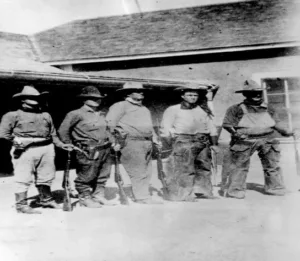
I grew up in Lubbock, a town of over 200,000, which has grown significantly since my childhood in the late fifties. Lubbock is best known for Texas Tech University, the Red Raiders and Buddy Holly. People might also remember that Mac Davis, another not so famous singer, hailed from Hub City. Pero, this article is not about them, or me; it’s about how the Raza community migrated to Lubbock. I will share insights from published reports and my personal experiences.
According to a published report in the Lubbock Avalanche-Journal, Raza began arriving in Lubbock around 1909, coinciding with the town’s incorporation and the active construction of railroads throughout Texas. The construction of railroads necessitated skilled railroad workers. Those workers were to come from El Paso and from our southern neighbor, Mexico.
The railroad contributed to a landscape change in Lubbock. Soon ranchland was converted into cotton fields with the railroad serving as a shipping source for the growing national demand for cotton. This led to the requirement for seasonal cotton workers for the fields and cotton gins, with many workers again coming from Mexico and South Texas to meet this need. Which I understand is why my own family, starting with my grandparents, made the track to Lubbock.
Most of these workers resided in labor camps, which later became known as Mexican Town or the Chihuahua District. Initially the Raza population boom in Lubbock was only seasonal. As time went by many decided to stay and find employment elsewhere between seasons.
For well into the sixties the Raza was largely involved in agriculture work, primarily in the cotton fields. It was either picking cotton or hoeing cotton which for those not familiar with the term it is cutting the weeds around the cotton crop. I personally remember working in the fields with my mom. And later as a teenager, hoeing or cutting cotton as it was called, I even did some work in cotton gins as a teenager. Which was at times dangerous, especially for a kid, but that was different time.
Fast forward to the seventies when Raza activism is taking shape in the form of the Chicano Civil Rights Movement. For me, my Activision was more on the economic part of the struggle at that time. I believed then that if we could just be more self-sufficient and support each other, that was the answer. I joined and later was elected first Vice President of the Commericantes Organizados Mexico Americanos de Lubbock with the acronym COMA. Which in retrospect maybe not to be a good idea to refer ourselves as that. Especially after the 1978 Horror movie by the same name (COMA) starring Michael Douglas.
Credited for starting the chamber was Bidel Aguero and other early contributors were Gilbert Flores, Roberto Lugo and Ernesto Barton among others. I served under Ruben Garcia as he was president during my term. In addition, Esther Sepeda was executive director and worked hard to raise the chambers’ profile and standing in the Lubbock community.
Part of my economic activism included creating bumper stickers that proclaimed, “I like to buy from Chicanos” My theory behind that was people would be encouraged to buy from Raza and or at least buy from a business that employed Raza. This I believed would force businesses to hire Raza if they didn’t employ one already. That is still a theory that I believe in, the problem is it seems like most people don’t’.
COMA was not the only Latino organizations in Lubbock then, LULAC Council 263 was established in the fifties if not before. My understanding is that local leaders Roberto Lugo and Ernesto Barton led the effort as well. I joined the council sometime in the seventies and was elected Vice president there also. And to this day I have at least one friend there that is still active. Sadly, most have passed away including the president I served under Chevo Moralez.
The Brown Berets had a chapter in Lubbock, often seen as a militant paramilitary group. Their president was Gilbert Herrara, and Jerry Lucero served as vice president. I attended a meeting of local Latino leaders and law enforcement; they (Brown Berets) provided security for event. They even had members on the roof with binoculars scanning the area. It was interesting to see a Latino group managing security at this event, especially with so much law enforcement present.
Lubbock also had a chapter of the American G.I. Forum group which is a Latino veterans group led by Robert Narvaez with others. There were political groups as well, I was a member of the Young West Texas Democrats) and worked on local campaigns. My highlight there was hosting Sargent Shriver when he came in to support the Ted Kennedy campaign.
As the Seventies progressed, Disco Music surged in popularity with John Travolta’s role in Saturday Night Fever. The Chicano Movement also gained momentum across Texas, including Lubbock. Dissatisfied with the Republican and Democratic parties which some labled a two headed monster, activists formed La Raza Unida Party in 1970. Led by Jose Angel Gutirrez and Mario Compean, the new party aimed to address Raza civil rights and promote self-determination. Locally, if I remember correctly Bidel Aguero led the local Raza Party.
By this time, working in the fields was largely a historical anecdote. Most of our community, lacking college education, shifted towards light manufacturing, service industries, and other blue-collar jobs. Gradually, we observed an increase in members of our community pursuing careers in education, social services, and law enforcement. Progress for the Raza in Lubbock was evident, although it required significant effort from dedicated individuals. Some I have referenced here but there were many others that I am sure I missed.
There is lots more to say about this area and time, Pero just not here. To find out more you can visit the Texas Tech history department and Lubbock Avalanche Journal archives. In addition, local Raza publication El Editor founded by Bidel Aguero RIP and now run by his daughter Sandia Aguero. In addition, you may check out Latino Lubbock publisher/owner Christy Martinez Garcia. You can reach El Editor at eleditor.org and Latino Lubbock at latinolubbock.net
Please understand that as stated above most of this article is from personal knowledge, shared information and what I’ve read. It is for that reason that I invite you the reader to reach out with your stories and personal experiences. In addition, I know that each city has its own Raza history, and I want to hear your stories. Remember it is up to us to preserve our history.
A.Govea email me at goveaalberto215@yahoo.com




